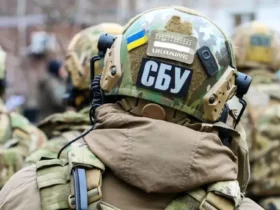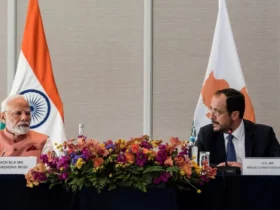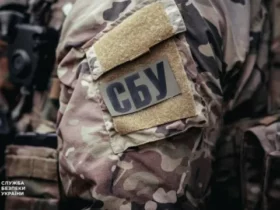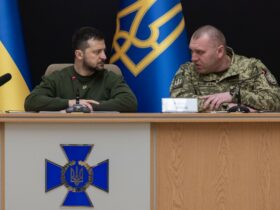The Fener (Istanbul) Patriarch Bartholomew’s visit to Ukraine (20-24 August) has already caused reactions from the Russian Orthodox Church. As I wrote in my previous articles, tensions between Istanbul and Moscow Patriarchates turned into a serious conflict and resulted in the termination of relations between these two significant churches of the Orthodox world because of the situation in Ukraine. In 2018, Istanbul Patriarch Bartholomew claimed that Ukraine is within the canonical territory of Ukraine and established a church structure, which is autocephalous (independent) in form, but dependent on Fener in reality. This angered Moscow, since Moscow considers Ukraine to be within its canonical religious territory. In addition, Ukraine is a significant place for both the Moscow Patriarchate (the roots of today’s Russian nation and the Russian Orthodox Church come from Ukraine) and for the Russian state. Moreover, as I emphasized in my previous articles, this is not a mere religious conflict, but above all, an international political conflict, where Fener is supported by the US and the Moscow Patriarchate is supported by the Kremlin. This Bartholomew’s visit was his first visit after the church conflict of 2018 and this visit was accompanied by supporters of Moscow Patriarchate in Ukraine.
During this visit, Bartholomew again made questionable arguments: On August 21 during the ceremony in Mihailovski Church in Kiev, Bartholomew said that the Istanbul (Fener) Church is not only the mother church of Ukraine, but also the mother church of many other Orthodox churches, including the Russian Orthodox Church and that Istanbul is ready to forgive their children, just like a mother. First of all, Fener’s “motherhood” is not recognized by the other autonomous churches. Fener does not have absolute authority in the Orthodox world (unlike the role of the Vatican in the Catholic world); it is recognized by the other autonomous churches just as “primus inter pares” (first among the equals). The other autonomous Orthodox churches respect Fener, but Fener does not have a right to interfere with the internal affairs of those churches. Moreover, the Russian Orthodox Church (Moscow Patriarchate) used to say that they respect Fener because of the fact that they had adopted Christianity from the Byzantine Empire and Fener is respected as an inheritor of Byzantine Empire, but at present, Fener has a small community in Turkey and the people who directly are directly subjected to Fener in the world are only a few million people, whilst the community of the Russian Orthodox Church consists of almost 200 million people. In addition, Moscow says that, during the Ottoman rule, when Fener needed money or other help, Moscow had always rendered support to it. For this reason, Moscow says that Fener has no right to dictate anything to Moscow.
Another claim of Fener Patriarch during that speech, which is much more questionable, was that the Istanbul (Fener) Patriarchate, “unlike some others”, did not try to assimilate others to whom it went with the Bible.
Whom did Bartholomew mean by saying “the others” is not clear: It might be argued that he meant the Catholics, since until the Second Vatican Council of 1963-64, national languages were not being used in Catholic churches: The dominant language in the Catholis world, used to be Latin. On the other hand, Orthodox churches offered more possibilities for the improvement of national cultures and national identities. Thanks to this, many Orthodox nations had the possibility of worshipping in their native languages. (The ability to worship in the native language in the Orthodox world is legitimized with the words of St. Paul, who says “but in a church meeting I would rather speak five understandable words to help others than ten thousand words in an unknown language”, in I Corinthians 14:19 of the New Testament). However, with regard to the fact that during his visit to Kiev Bartholomew met with the leaders of the Catholic clergy and said warm words about the future unity of the Christians, it is hardly possible that he meant Catholics. Probably he meant the Russian Orthodox Church, which is accused by many of ignoring Ukrainian national identity.
Byzantine and missionaries
But let’s put aside the claims concerning the Russian Orthodox Church and look at the claims of Bartholomew. If we take a look at the history, we will see that, despite the freedom in the Orthodox world toward the national cultures in general, the Fener (or Istanbul) Patriarchate has never been so eager to show tolerance to the non-Greek Orthodox nations. In the 9th century, upon the end of the inner conflicts within the Orthodox world concerning theology (such as the discussions concerning the Holy Trinity, iconoclasm, etc), The Istanbul Church launched missionary activities toward the nations that lived beyond the borders of the Byzantine Empire. In this regard, two Byzantine brothers-missionaries who were of Macedonian Slavic origin, Cyrill and Methodius, invented an alphabet for the Slavic nations, which was based on the Greek alphabet, but which included some voices of the Slavic languages, which did not exist in Greek (This initial alphabet was called Glagolitic alphabet). They visited Moravia (in today’s Czech Republic) and created a great local community there, but after their death, their followers and successors could not resist the German influence in Moravia anymore and were forced to leave the region. When they came to the Balkans, they developed the alphabet and the alphabet was named after Cyrill. At that time, Bulgaria had adopted Orthodoxy (the first Chrtistian Bulgarian monarch Boris had at first intended to adopt Christianity from Rome, fearing the influence of the neighbouring Byzantine state, but after a huge Byzantine army camped on the Bulgarian border, he was forced to adopt Christianity from Constantinople). After the adoption of Orthodoxy by Bulgaria in 865, Boris Khan found the state under strong influence of the Byzantine Empire and decided to adopt Catholicism, which, together with some other problems, led to the first schism in the Christian world. However, after Boris realized that Rome would not offer them anything more and after the Istanbul Churchagreed to give autonomy to them, Boris again adopted Orthodoxy. However, fearing the possibility of Hellenization, he gave orders to develop the Church Slavonic language as the language of worship and theology. Thus, it was the initiative of Boris Khan that helped the Bulgarians not to be assimilated by the Istanbul Patriarchate.
Bulgaria and autocephaly
During the medieval ages, existence of an independent (autonomous) Bulgarian church was closely related with the independence of the Bulgarian state. When the Bulgarian state collapsed in the 10th century, this brought the end of the autonomous Bulgarian Church (with its center in Trnovo). (It is also worth remembering that the First Bulgarian Kingdom was destroyed by the Byzantine Emperor Basil II, who has the nickname Bulgar Slayer. In a war with the Bulgarians, he had taken 14,000 Bulgarian prisoners of war and had their eyes rubbed. He would excuse only one eye of the one out of one hundred Bulgarian prisoners to lead their friends back to Bulgaria. When the Bulgarian Tsar Samuel saw this scene, he would die from his grief. That same Basil II Bulgar slayer was the person who would introduce the ancestors of Russians and Ukrainians with Christianity).
During the Second Bulgarian Kingdom, Bulgarians again obtained autocephaly. But if Bulgarians and Serbians managed to get autonomy from the Istanbul Patriarchate, this was not a result of “generosity” of the Istanbul Patriarchate, but rather the result of the circumstances in which the Byzantine Empire and the Istanbul Patriarchate found themselves: In 1204, Constantinople was occupied by Catholic Latin Crusades and this brought a temporary end to the Byzantine Empire. Three dynasties in various places of the empire declared themselves to be the rulers of the Byzantine Empire: In Trebizond, the Komnenos Dynasty, in Epirus, the Angelos Dynasty and in Nicea, Lascaris Dynasty declared themselves to be the inheritors of the empire. The last patriarch had also died without pointing out an heir. For this reason, it was not clear whether the clergy or Nicea, Trebizond or Epirus would be the inheritors of the Istanbul Patriarchate. Under those circumstances, the church in Nicaea established contacts with Bulgarian and Serbian churches and granted them autocephaly. In return, it was recognized by them as the inheritor of the Istanbul Patriarchate.
The Ottomans and Fener
After the conquest of Istanbul by Mehmed II (the Conqueror) in 1453, Sultan Mehmed II decided to use the patriarchate to take the whole Orthodox population of the empire under control. In other words, the Istanbul Patriarch would be granted broad rights which he did not have even during the Byzantine period and in return, he would be responsible for the allegiance of the whole Orthodox population. The conquest of Bulgaria and Serbia by the Ottomans had already brought the end of Bulgarian and Serbian autocephalous churches and after the conquest of Istanbul, they would be subjected to the Istanbul Patriarchate (only the Western Bulgarian Church with its center in Ohrid would pertain to its autonomy). The Serbian church again obtained autocephaly in the 16th century due to the fact that the then Grand Vizier (today’s prime minister) Sokollu Mehmed Pasha was of Serbian origin.
Hellenized Bulgars
The Orthodox population in the Balkans, beginning from the 18th century, were subjected to Hellenization: The Istanbul Patriarch Samuel I in the second half of the 18th century abolished the autocephaly of the Serbian and Western Bulgarian (Ohrid) churches and he banned education in Bulgarian. From then on, Hellenization of the Bulgarian population began. As the Serbs were far enough from the center, they kept themselves away from Hellenization. On the other hand, many Bulgarians were assimilated by Greeks at that time. For this reason, when the Bulgarian nationalism emerged at the end of the 18th century, its first opponent was the Fener church and the Greek clergy. In other words, Bulgarian nationalism in its first phase was more an anti-Greek movement than an anti turkish movement. When Bulgarian nationalism gained more popular support in the middle of the 19 century, its main aim was obtaining an autonomous Bulgarian Orthodox church. As the Ottoman Government realized that Fener Patriarchs were in close contact with Greek nationalists in the second half of the 19 century, they deemed proper to give approval to the creation of the Bulgarian Orthodox Church in 1872. However, Fener would refuse to recognize this church until 1945, until the active interference of the Moscow Patriarchate.
Also in the 18th century, Fener separated the Orthodox community of Romania from the Serbian Orthodox Church. Although it did not introduce such intensive Hellenization policies like those in Bulgaria, again, in the beginning of the 19th century, Romania was called “an island of Hellenization”. Moreover, many leaders of the Greek independence struggle were planning to begin the rebellion from Romania (however, later it would be clear that the Romanian peasants had no sympathy to the Greek cause and they had no wish to provide massive support to this struggle).
Fener and Orthodox Arabs
During the Ottoman Empire, Fener also gained absolute authority over the Alexandria, Antiochia and Jerusalem patriarchates. Those patriarchs did not have the direct access for communication with the Ottoman Sultan; they had to hand over all of their demands through the Fener Patriarch. Moreover, in the 18th century, those patriarchs had to live in Istanbul, directly in Fener, under the control of the Fener Patriarch. Despite the flocks of those patriarchates were Orthodox Arabs, Fener tried to Hellenize the clergy of those patriarchates. Even today, the clergy of the Jerusalem and Alexandria Patriarchates are Greeks. The patriarchs of Antiochia were also elected from the Greek clergy until the end of the 19th century and only in 1899, as a result of the direct interference of Russia, an Arab patriarch was elected in Antiochia (Despite that patriarchate bears the name “Antiochia”, it has been located in Damascus since the 13th century).
For all of those reasons, Bartholomew and the other members of the high clergy of Fener must take a look at history and to see those widely known facts before claiming that Fener had never introduced assimilation.

















Leave a Reply